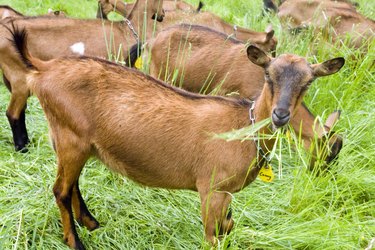
An ancient idea made new again, using goats for lawn mowing is touted as a green way to keep lawns tidy. Environmentalists encourage using goats to mow because of their very small carbon footprint -- and they fertilize lawns naturally as they go. While goats do an impressive job of clearing woods and thickets, they have strengths and weaknesses as lawn mowers.
Running on Forage
Video of the Day
Goats run on what they eat and don't emit carbon as they mow, but using goats as mowers still involves a certain amount of carbon. If the goat herd is borrowed, they have to be trucked from their farm and back. They also likely get some kind of supplemental feed for at least part of the year. Feed requires significant labor and fuel to grow, harvest, process and deliver, so some environmental impact does occur.
Video of the Day
Goats Eat Everything
Goats eat most lawn weeds, as well as grass. They love kudzu (Pueraria lobata), hardy in U.S. Department of Agriculture plant hardiness zones 5 to 10 and considered invasive, and poison ivy (Toxicodendron radicans), hardy in USDA zones 3 to 10. Other plants that suit their fancy include wild roses (Rosa arkansana), hardy in USDA zones 4 through 8, and blackberries (Rubus fruticosus ), hardy in USDA zones 5 to 9, along with assorted brambles and saplings. If goats are allowed to forage near where beloved ornamentals grow, fence off those areas from the grazing hoard. A goat generally won't eat plants deer avoid, but they can cause significant damage sampling new plants. Goats also chew young trees, peeling off bark and accidentally killing the tree.
Goats Require No Sharpening
It's true that goats don't require any sharpening or tuning up before lawn mowing season starts. They don't throw rocks at windows or break things as a rule -- though they may chew cord or hoses left lying around. However, they do require care all year long, and carrying warm water to them all winter is a lot of work compared with tuning up a lawn mower. Of course, this isn't an issue with rented goats.
Goats Spread Fertilizer
Part of the charm of goats for many is the natural fertilizer they leave on the lawn as they eat. Fresh goat manure contains 1.44 percent nitrogen, 0.5 percent phosphoric acid and 1.21 percent potassium, and it doesn't burn plants like other fresh manures might. Goat manure is pelleted and dry, so it doesn't cause a mess. However, lawns being mowed by goats must not be treated with chemicals, and weeds that goats refuse to eat still must be managed if they remain untrampled.
Goats Don't Manicure
Goats have no idea they're grazing your lawn to keep it trim. In fact, they tend to prefer new growth to old and avoid grass that's too high. Goat grazing does not initially result in a manicured lawn. Over time, however, goats trample unwanted weeds in a rush to get to clovers (Trifolium spp.), hardy from USDA zones 3 to 11, and dandelions (Taraxacum officianale), hardy in USDA zones 3 to 9, along with other weedy favorites. Regular use of grazing goats over a long period transforms your lawn into a beautiful sea of grass. They even eat dried leaves.
Goats Climb
Any opportunity to move to higher ground, goats take it. They relish finding tall things to stand on while munching plants that would otherwise be out of reach. Sometimes they climb just for fun. When using goats to mow the lawn, expect them to climb on your porch, your car or into your trees -- or anything else within reach. It's best to keep climbable objects out of their way if you wish to use a goat herd for mowing.
Goats Are Cute
Few people object to goats grazing on the lawn. In fact, many people love goats for their curious and amiable nature. The many pet goats in the United States attest to that. However, hiring a herd of goats is not the same as hiring a petting zoo. Even the most socialized goat is still a goat, and it may knock people around if they work against the animal's nature. Worse yet is the goat mob, which appears out of nowhere when socialized goats hear the crinkle of a bag of corn chips. A person may find himself surrounded by relentless beggars. This is especially problematic with dairy goats that are frequently spoiled with treats.